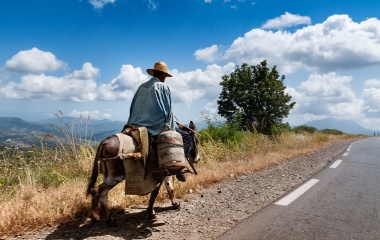
As I noted in my last post I had the honour of speaking at the Beit Yehudah synagogue in Budapest last shabbat. Below is a summary of my words. As this week is parshat Balak I have incorporated an idea from this week's parsha.
The parah adumah, the law of the red heifer, is generally considered the ultimate chok of the Torah, a law that seems to defy reason. Its strange ritual details is made more incomprehensible by the fact that while the ashes of the cow purify those who are impure it makes those who are pure, impure. Yet the great enigma is not so much the strange ritual of purification after coming in contact with death, but rather death itself. The why’s of death are truly incomprehensible. We sanctify life, but must all face death.
Parshat Chukat is the parsha of death. It is the parsha of transition from year one and two after the Exodus to year 40, from the generation that left Egypt to the new generation that would enter the Land of Israel. In the intervening years there is no Torah narrative. It was years of death and the parah adumah – purification from death is the perfect segue from the rebellion of Korach soon after leaving Egypt to the death of Miriam soon before entering the Land of Israel.
The term chok does not only refer to a law that is difficult to understand. A chok is a statute, ordinance, or decree. It is derived from the word chokek which means to engrave. In other words, a chok is a law that is engraved into the fabric of nature, a law that must be, akin to the laws of science. The world could not operate if the laws of nature were not in place. With the spiritual and physical worlds' complementary manifestations of the Divine Creator, the world also cannot operate without the chukim of the Torah.
Tragic as it is for the individual, for a society as a whole death is absolutely necessary. Imagine what our job prospects would be like if people did not die; executives might stay on for hundreds of years, grooming a successor as one nears retirement would not exist.
More importantly, if people did not die there would be no hurry to do anything. Procrastination would become endemic. This would be a great moral crisis. There would be no need to repent any time soon.
This idea is reflected by the comment of Rav Meir on the verse summarizing creation. “And G-d saw that it was tov me’od, very good”. Rav Meir, using a play of words, comments that tov me'od should be read as tov hamevet, death is good. Death is part of the fabric of what allows the world to be tov me’od.
Both Miriam and Aharon’s deaths are described in parshat chukat and the death of Moshe is decreed. If Moshe sinned – though what exactly what his sin was is not clear - why Aharon and especially Miriam had to die is unclear. But this too is part of the chok of the Torah; new leadership would be required for the entry to the Land of Israel.
While our leaders had to die we were not left leaderless. The Torah describes how Elazar took the mantle of leadership from his father. Parshat Pinchas describes the choosing of the leader who would replace Moshe. Yet we find no one is chosen to replace Miriam. This can only mean that we all are the ones who must replace Miriam.
Miriam represents the notion of hope defeating despair, that the Jewish people always move forward no matter how dire the situation may look.
It is Miriam who is most responsible for the redemption of the Jewish people. It was Miriam, our rabbis assert, who convinced her parents to have another child. Why have children in such a cruel world, where babies are thrown in the Nile many argued? It was Miriam who watched over Moshe as he floated in the Nile, ensuring his survival. It is not by chance that our Sages assert that it was in the merit of Miriam that we had water in the desert.
We, the Jewish people, are all tasked to be the successor to Miriam. To build for the future, regardless of past or the present.
Hungary is a place of death. Some 600,000 Jews were killed here and a culture wiped out. The Holocaust is the greatest of chukim, of something incomprehensible. Our enemies would like to perpetuate another one.
Our Sages teach regarding Bila'am that “in the path that one desires to go is the path that we lead them to”. The Jewish people could have given up after the Holocaust, and many times before. And many individual Jews have done exactly that, such that there are likely hundreds of millions of people around the world who have Jewish ancestry. But the Jewish people as a whole do not give up, working towards a world where nation shall not lift up sword against nation, where righteousness and justice will spread throughout the world, towards the day that G-d shall be King over all the land.
To see a renaissance of Jewish life in Hungary[1] – small as it is, is another demonstration of the resilience of the Jewish people. And when someone who grew up here comes back to serve the Jewish people in their native country, there is great hope for the future.
[1] One might argue that all Jews should move to Israel. Whether or not that is true is irrelevant, all Jews are not moving to Israel and wherever there may be Jews we must reach out and help Jewish life flourish to the extent possible.



